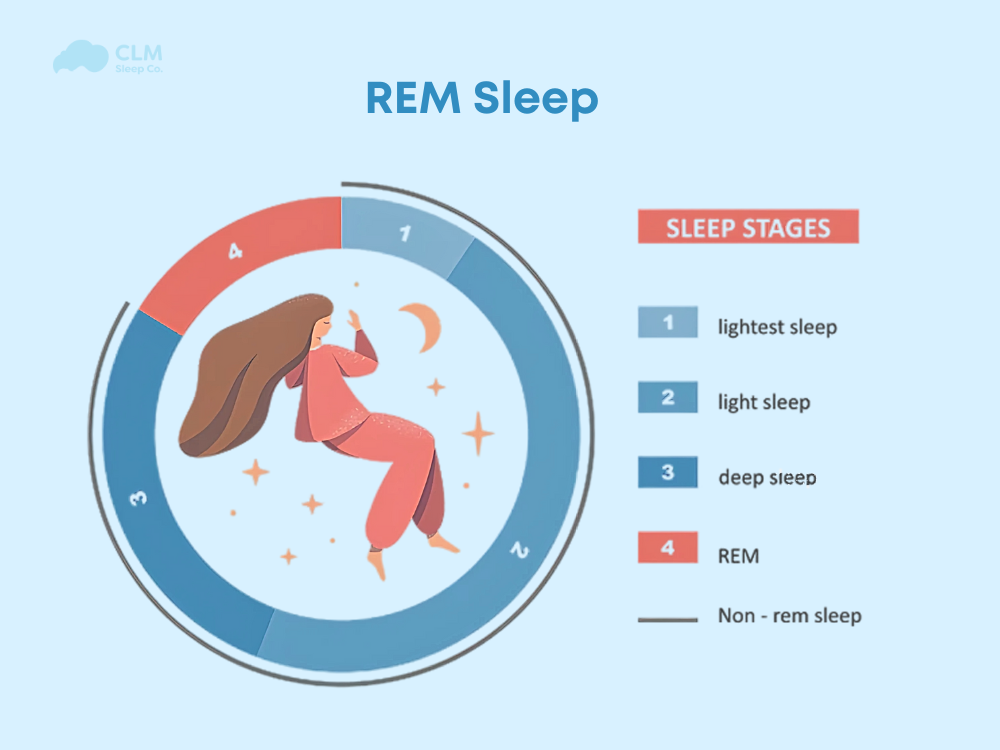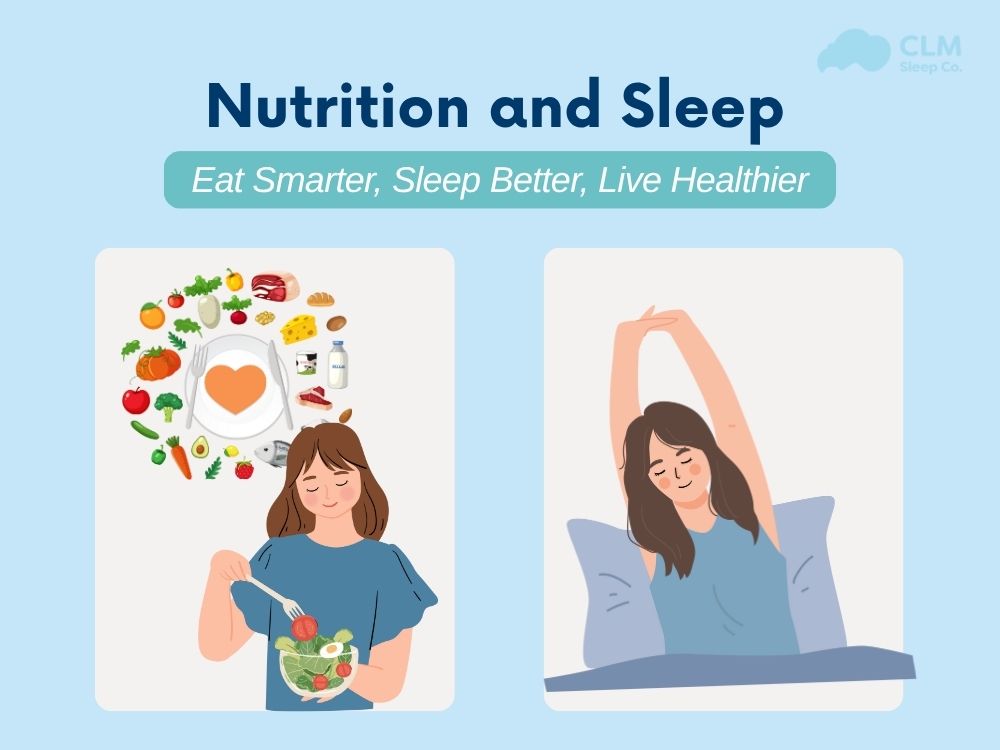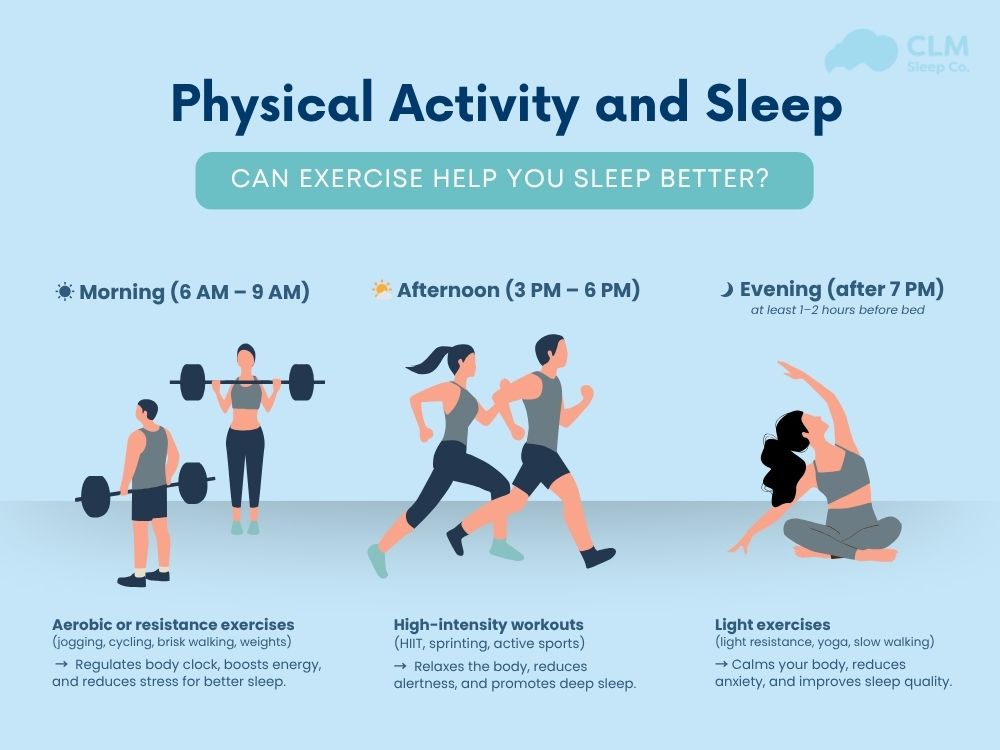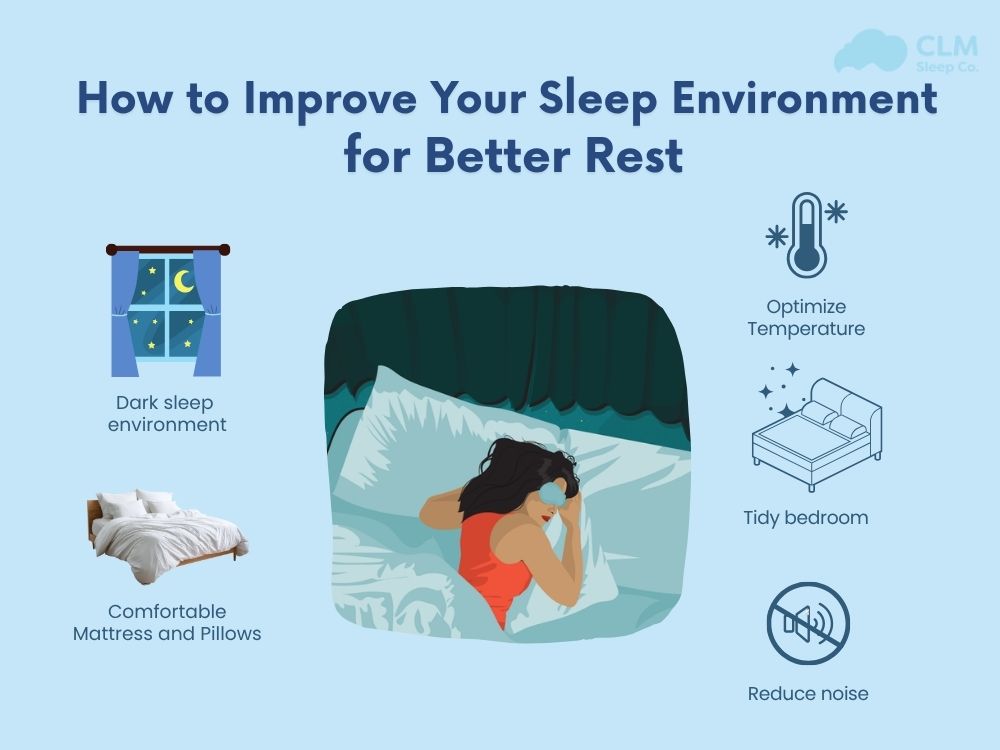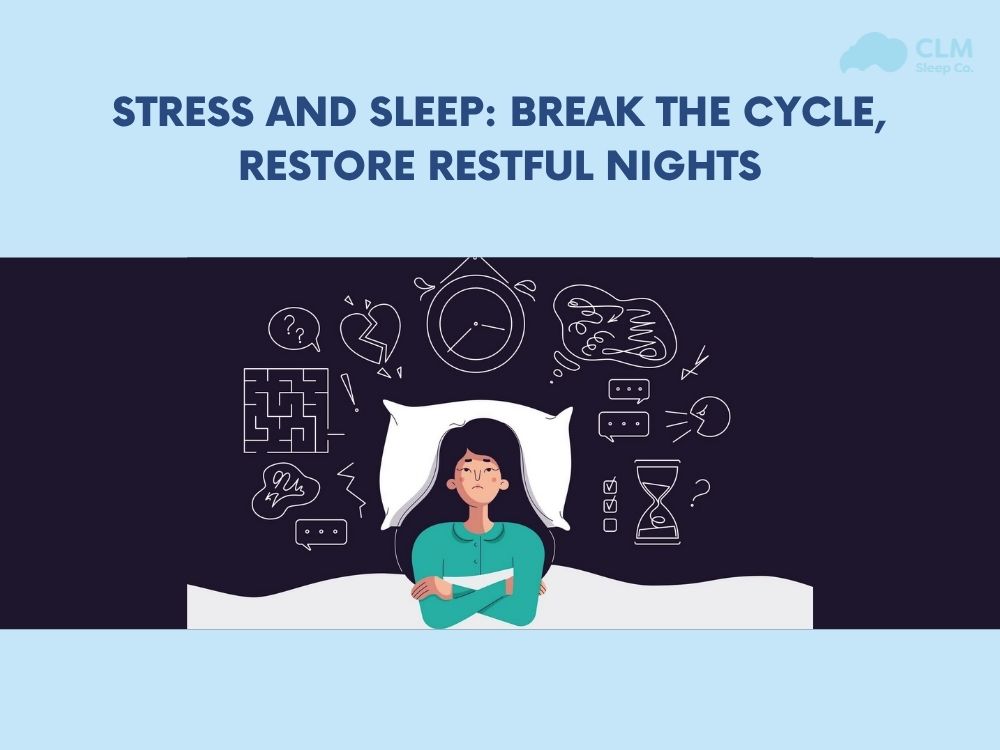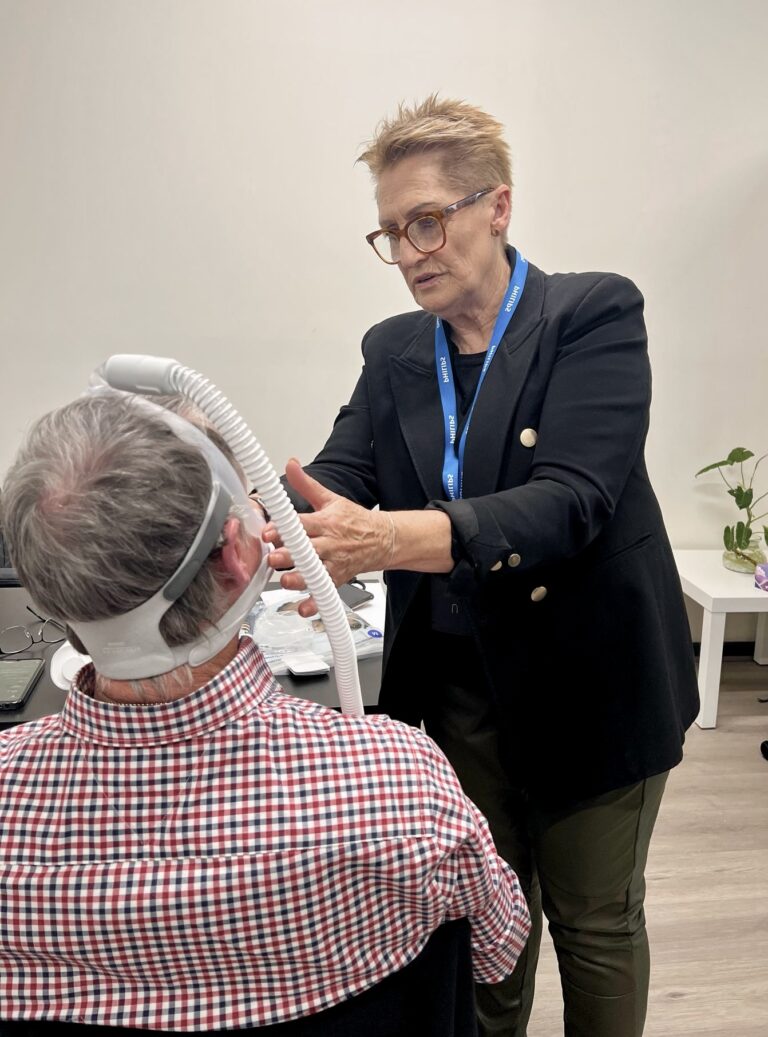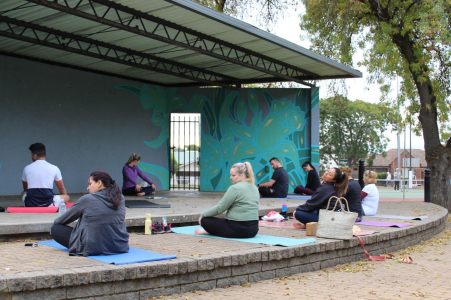REM sleep supports brain function, emotional balance, and physical health and, hence, an important sleep process for total well-being. This guide by CLM Sleep tells you what REM sleep is and why it matters and impacts your long-term health.
What is REM Sleep?
REM sleep, which is short for Rapid Eye Movement sleep, is one of the four main stages of sleep and plays an essential role in overall health and brain function. It is named after the rapid movement of the eyes that occurs beneath the eyelids during this stage. However, this stage involves involves much more than eye movement. It is a period when the brain becomes highly active, vivid dreams occur, and important mental restoration takes place.
During this stage, the brain functions almost as if it were awake. This is the stage when most dreaming happens. These dreams are often emotional, detailed, and story-like. At the same time, the body experiences a state called muscle atonia, which means that voluntary muscles are temporarily paralyzed. This prevents you from physically acting out your dreams while the brain stays active.
When Does REM Sleep Occur?
After about 90 minutes from sleep onset, the first REM sleep period occurs; afterward, there is a repeat every 90 to 120 minutes during a night’s sleep. Each REM cycle becomes progressively longer, the last one lasting up to 60 minutes. Most adults spend roughly between 20 and 25% of their entire sleep time in REM.
Is REM sleep good? The important role of REM sleep in the sleep cycle.
Yes, wakefulness and sleep alternate throughout our lives. Emotional well-being, cognitive work, and physical recuperation all depend on REM sleep. REM-assists in learning, mood stabilization, memory consolidation, and, paradoxically, also in boosting immune efficiency. Without sufficient time in this stage, both brain and body find it difficult to perform their functions at an optimal level.
| Feature | REM Sleep | NREM Sleep |
| Full Name | Rapid Eye Movement Sleep | Non-Rapid Eye Movement Sleep |
| Eye Movement | Rapid, random eye movements | Minimal or no eye movement |
| Brain Activity | High, similar to waking state | Slower brain waves; reduced brain activity |
| Dreaming | Vivid, emotional, and story-like dreams | Less frequent, less vivid dreams |
| Muscle Activity | Muscle atonia (temporary paralysis of voluntary muscles) | Muscle tone is reduced but not completely absent |
| Sleep Cycle Timing | Begins ~90 minutes after falling asleep; cycles throughout night | Occurs first and dominates the early part of the night |
| Duration | Increases with each cycle; final REM can last up to 60 mins | Longer in the first half of the night, gradually shortens |
| Memory Function | Important for emotional and procedural memory consolidation | Essential for declarative (factual) memory consolidation |
| Physiological Activity | Irregular heart rate and breathing; increased brain oxygen use | Slower heart rate and respiration; body temperature drops |
| Body Repair & Growth | Supports brain restoration and emotional recovery | Supports physical restoration, tissue repair, and immune function |
| Proportion of Total Sleep | Around 20–25% | Around 75–80% (Stages 1–3, with Stage 3 being deep sleep) |
See more about other stages of sleep: light sleep is a part of the NREM phase.
Characteristics of REM Sleep
REM (Rapid Eye Movement) sleep is a unique stage in the sleep cycle with several distinguishing features:
How to know the exact time of your sleep stages?
You can use electronic devices such as smartwatches, fitness trackers, and smart rings to monitor your sleep. However, these devices depend on heart rate, body movement, and blood oxygen levels, so the results are only estimates
You should get a specialized sleep examination, which may include:
In-lab sleep study (PSG) uses multiple sensors to measure brain waves (EEG), muscle activity (EMG), heart rhythm (ECG), breathing, eye movements, and more.
Home Sleep Apnea Test (HSAT) is a home sleep monitoring device, simpler but still effective in detecting issues like sleep apnea.
At CLM Sleep, we also provide sleep studies and diagnosis services for people with sleep problems
- Chronic insomnia
- Sleep apnea (Obstructive or Central Sleep Apnea)
- Unexplained daytime sleepiness
- Sleeping deeply, waking up multiple times at night
- Sleep disturbances due to stress or anxiety
- Other disorders related to sleep cycles.
How does REM sleep affect health?
REM sleep is essential for both mental and physical well-being. It supports emotional stability, cognitive performance, and overall health in several key ways:
Mental Health Benefits
- Emotional Regulation: This sleep stage helps the brain process emotions, reduce anxiety, and stabilize mood, making it vital for mental resilience.
- Stress Reduction: By allowing the mind to recover from emotional strain, it contributes to lower stress levels.
- Mood Stabilization: Consistent high-quality sleep cycles help prevent mood swings and lower the risk of depression or irritability.
Cognitive Health
- Memory Consolidation: REM sleep strengthens long-term memories, especially emotional experiences and procedural learning (like skills and habits).
- Creativity Boost: It enhances creative thinking by promoting new connections between ideas during dreaming.
- Improved Focus and Clarity: A healthy REM cycle supports attention span, decision-making, and overall cognitive sharpness.
Physical Health
- Brain and Body Recovery: While deep non-REM sleep handles most physical repair, this later stage of sleep helps restore brain function and replenish energy levels.
- Immune Support: Emerging research suggests that is may support the immune system, helping the body fight infections more effectively.
Impact on Long-Term Health
- Heart Health: Adequate REM sleep is associated with stable blood pressure and a lower risk of cardiovascular disease.
- Weight and Metabolism: Disrupted in this stage of sleep can interfere with hunger-regulating hormones, increasing the risk of weight gain and metabolic disorders.
Consequences of Lack of REM Sleep
Inadequate REM sleep can lead to various short- and long-term health issues:
- Cognitive Impairments: Lack of REM sleep hampers the brain’s ability to consolidate memories, solve problems, and maintain focus. You may experience forgetfulness, slower thinking, and difficulty concentrating.
- Emotional Issues: Poor sleep quality is linked to increased emotional instability, heightened anxiety, irritability, and a greater risk of developing depression.
- Physical Health Risks: Chronic sleep deprivation can weaken the immune system, making you more prone to illness. It may also contribute to cardiovascular problems, irregular blood pressure, and metabolic imbalances such as weight gain or insulin resistance.
Conclusion of the article
REM sleep is far more than just a dreaming stage – it’s a vital part of your nightly rest that supports mental clarity, emotional resilience, physical health, and long-term well-being. At CLM Sleep, we emphasize the importance of understanding your sleep cycles to optimize health outcomes. Prioritize quality sleep and protect your REM cycles for a healthier, more energized life.
See more: Cpapdiscount
